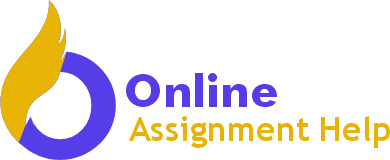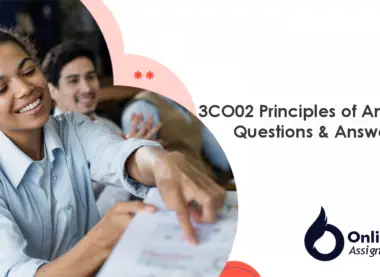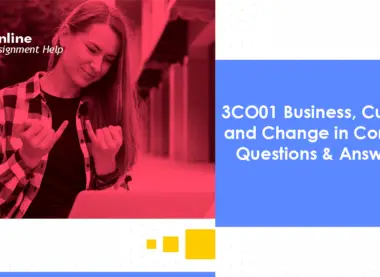Table of Contents
3CO03 Core Behaviours for People Professionals Questions
Task One – Ethical practice review
A key responsibility for all ‘professionals’ is to regularly review and develop our performance at work. This includes reviewing our work and interpersonal behaviours – a particularly important activity for people professionals.
In this task, you as a people professional (working or student), are asked to answer 4 review questions about your work behaviours, with a particular focus on ethics, inclusivity and how you interact with others.
To complete the task, please respond to all four questions below. Your responses should reflect a sound understanding of ethical and inclusive people practice and include a mix of explanation (description/discussion) along with examples, as required by the question.
- Explain one ethical principle and one professional value that you consider to be important, and which underpin your behaviour at work (or in your studies). For each of these, provide a real example of HOW they inform your approach to work. (AC1.1)
- Describe, with examples, two ways in which you as a people professional conform (or, in future employment, would conform) with ethics related legislation. (AC1.2)
- For each of the three contexts (a, b, c) below, describe one example of how you have behaved in a way that was inclusive and respectful to others, and one way in which you could further enhance your behaviour. (AC2.1)
a) contributing your views and opinions
b) clarifying problems or issues
c) working effectively as part of a team - Explain why it is important for a people practice professional to stay up-to-date with developments in the world of work and people practice and recommend two methods you have found most effective for this purpose. (AC2.2)
3CO03 Assignment Answers
Task One – Ethical Practice Review
Q1 – AC1.1
As a people professional, I adhere to two fundamental principles in my work: ethical integrity and inclusivity. These concepts are crucial not just in personal behaviour but also for moulding professional practices according to the guidelines of the CIPD.
Ethical integrity, an ideal grounded in moral rectitude, transparency, and veracity, is vital for cultivating trust and credibility in a professional environment. When dealing with sensitive employee data, I strictly adhere to confidentiality and privacy standards, guaranteeing the protection and ethical use of personal information. This practice is in line with the CIPD’s focus on ethical conduct and data protection, guaranteeing that personal and sensitive information is managed with the highest level of care and respect (CIPD, 2022).
Inclusivity, conversely, entails establishing an atmosphere that values diversity and ensures that all individuals are afforded equitable opportunities for achievement. This ideal transcends mere compliance with legal obligations; it entails cultivating an environment that actively seeks and appreciates a wide range of viewpoints (CIPD, 2019). Practically, this entails actively striving to eradicate biases in recruitment procedures and advancing diversity and inclusion programmes within the organisation (CIPD, 2023). An instance that exemplifies this is my active participation in coordinating diversity training sessions, which have the objective of enlightening staff about unconscious biases and the significance of fostering a workplace that is diverse and inclusive.
The CIPD outlines that both ethical integrity and inclusivity are fundamental ideals that form the basis of the people practice profession. They shape my work approach by guaranteeing that my actions and decisions adhere to both legal requirements and ethical principles, while also being mindful of cultural sensitivities. These principles serve as a compass for me when making decisions that prioritise the organisation’s interests while also upholding respect and fairness for all individuals concerned.
Q2 – AC1.2
Complying with ethics-related legislation is a crucial component of professional practice for individuals working in the field of people practice. Adhering to this conformity guarantees that workplace procedures not only meet legal requirements but also maintain high ethical standards.
Compliance with Equal Employment Opportunities Legislation
Equal employment opportunity laws, such as the Equality Act 2010, require that employment decisions be made without any kind of discrimination related to protected attributes such as race, gender, age, or disability (Eikhof, 2020). As a people professional, complying with these regulations would entail adopting impartial recruitment and selection procedures. As a prospective HR manager, I would prioritise the implementation of neutral and inclusive job descriptions, provide training on unconscious bias to selection panels, and evaluate candidates based on objective and job-relevant factors. Implementing this technique not only reduces the likelihood of discriminatory actions but also promotes a working atmosphere that is diversified and inclusive.
Ensuring adherence to Privacy and Data Protection Laws
Privacy and data protection are of significance in HR operations, particularly in light of laws such as the General Data Protection Regulation (GDPR) in the European Union (Ryngaert and Taylor, 2020). As an assistant HR practitioner, my responsibility is to ensure that the personal data of employees is gathered, stored, and processed securely and in accordance with the law. As a future HR manager, I plan to enhance the implementation of strong data security measures, acquire explicit consent for data gathering where necessary, and guarantee that data is used exclusively for its intended purpose. Adhering to this policy not only upholds employees’ private rights but also strengthens the trust and integrity of the HR function.
The aforementioned instances illustrate the fundamental role of ethics-related legislation in establishing appropriate procedures for managing personnel. By rigorously abiding by these regulations, a people professional ensures adherence to legal requirements and showcases dedication to ethical values, thus safeguarding the organisation’s reputation and integrity.
Q3 – AC2.1
Within people practice, exhibiting ethical and inclusive conduct is not only a professional requirement but also a crucial element of successful personnel management. The CIPD’s standards on ethical practice and inclusivity emphasise the importance of principles such as fairness, respect, and empathy in shaping this conduct.
- Contributing Perspectives and Viewpoints
As a professional in people practice, sharing perspectives and viewpoints goes beyond simply conveying thoughts; it necessitates doing it in a manner that promotes inclusiveness and respect (CIPD, 2023). One instance from my personal experience pertains to team brainstorming meetings, where I endeavour to express my viewpoints in a considerate manner, while also valuing the variety of ideas provided. In order to improve this conduct, I can further actively engage in the practice of active listening, which involves making a conscious effort to thoroughly understand and take into account the viewpoints of others before expressing my own.
- Clarifying Problems/Issues
Resolving ethical and inclusive challenges requires a comprehensive comprehension of the specific problem and the various viewpoints involved (CIPD, 2023). When faced with ambiguous project objectives, I have made an effort to pose open-ended inquiries, fostering a discussion that facilitates the expression of diverse perspectives. In order to further improve this conduct, it would be advantageous to cultivate a more empathic approach to problem-solving (CIPD, 2022). This would involve ensuring that all parties involved feel acknowledged and appreciated throughout the process.
- Working Effectively in a Team
Within a team setting, the behaviour of being inclusive and respectful leads to the effective collaboration of team members and the acknowledgement of each individual’s contributions (CIPD, 2023). A concrete illustration would be a collaborative endeavour in which I meticulously secured a fair allocation of tasks and duly recognised the contributions of each team member. In order to enhance my performance, I could prioritise the comprehension and adaptation of various working methodologies, fostering an even more comprehensive and cohesive team synergy.
Q4 – AC2.2
In the sphere of people practice, maintaining an up-to-date understanding of work and industry trends is crucial.
Importance of Staying Updated in People Practice
- Adaptation to Industry Evolution
The world of work is in a state of constant flux, influenced by technological advancements, economic changes, and evolving societal expectations. For people professionals, staying attuned to these shifts is crucial to ensure that their practices and policies remain relevant, effective, and aligned with contemporary workforce needs (Eikhof, 2020).
- Compliance with Evolving Standards
Moreover, the legal and ethical landscape surrounding people practice is also continually evolving. Keeping abreast of these changes is essential to ensure compliance with new regulations and standards, thus safeguarding the organization against legal and ethical breaches (CIPD, 2019).
Methods for Staying Informed
- Engaging in Professional Development Programs
One method to stay informed is through professional development programs. These programs offer in-depth knowledge and the latest insights in the field, often provided by industry experts. They facilitate practical learning, helping professionals apply new knowledge directly to their work (CIPD, 2022). However, these programs can be time-consuming and may require a significant investment, both in terms of time and resources.
- Active Participation in Professional Bodies and Forums
Another effective method is active participation in professional bodies, such as the CIPD. These platforms provide access to a variety of resources, including research papers, case studies, and expert opinions (CIPD, 2023). Participation in these bodies offers a comprehensive view of the field, keeping professionals informed about broader trends and best practices. The drawback here is that the information might be too extensive and require additional effort to distil and apply in specific organizational contexts.
Ultimately, for a people professional, staying informed through professional development programs and active participation in professional bodies is crucial. While each method has its unique strengths and limitations, they collectively contribute to a well-rounded approach to staying updated in the ever-evolving field of people practice.
Task Two – Professional Development
(AC2.3)
A Continuing Professional Development (CPD) record entails a logical depiction that documents an individual’s proactive endeavours to maintain and improve their knowledge, skills, and competences in people practice. It serves as a thorough documentation of diverse activities conducted during a specific period. This record not only documents the elements of these activities but also provides an in-depth examination of their influence on the individual’s work conduct and effectiveness. This tangible manifestation is an evidencial representation of the person’s commitment to continuing their professional development and improving their practice in compliance with the guidelines outlined by the CIPD Profession Map.
Outlined below is my CPD record, denoting three crucial activities undertaken over the last 12 months
The three CPD activities outlined in the record above, which correspond to the competencies delineated in the CIPD Profession Map, have had a substantial influence on my work conduct and output throughout the previous twelve months.
The Core Behaviours Workshop conducted in January 2023 had a significant influence on my behaviour at the workplace as well as productivity. The training herein substantially improved my comprehension of ethical decision-making as well as approaches that prioritise people, leading to a significant transformation in my decision-making style. I developed a more thoughtful approach in evaluating the ethical consequences of my behaviour, which subsequently had an advantageous effect on my dealings with co-workers. Consequently, there was a notable enhancement in team relationships, a heightened level of trust, and a better capacity to collaborate.
The completion of the People Practice Course in June 2023 enhanced my understanding of people management, particularly in the context of learning and development. Utilising this recently acquired knowledge, I revamped our training courses, leading to increased engagement and improved performance among team members. This transformation had a direct influence on the calibre of work performed and the general efficiency of the team.
The Inclusive Leadership Seminar held in October 2023 had a crucial impact on fostering a more inclusive work environment. I swiftly utilised the extensive knowledge I acquired about inclusive leadership principles. As a result, the workplace cultivated an environment where team members from all backgrounds were esteemed and empowered, consequently promoting enhanced collaboration and more creative resolution of problems.
Ultimately, each of these activities had a profound effect on my work behaviour as well as performance, boosting my capacity to make ethical decisions, manage people effectively, and promote inclusivity in the workplace. These enhancements have had a beneficial impact on team camaraderie, productivity, and teamwork.
References
CIPD (2019) Ethics at work: An employer’s guide. Available at: https://www.cipd.org/uk/knowledge/guides/ethics-work-guide/ (Accessed: 20 January 2024).
CIPD (2022) HR and standards: Discover British and International standards in human resource management, and our role in their development. Available at: https://www.cipd.org/uk/knowledge/factsheets/hr-standards-factsheet/ (Accessed: 20 January 2024).
CIPD (2023) Equality, diversity and inclusion (EDI) in the workplace. Available at: https://www.cipd.org/uk/knowledge/factsheets/diversity-factsheet/#6428 (Accessed: 20 January 2024).
CIPD (2023) Ethical practice and the role of people professionals. Available at: https://www.cipd.org/uk/knowledge/factsheets/ethics-role-hr-factsheet/ (Accessed: January 21, 2024).
Eikhof, D.R. (2020) ‘COVID-19, inclusion and workforce diversity in the cultural economy: what now, what next?’, Cultural Trends, 29(3), pp. 234–250. Available at: https://doi.org/10.1080/09548963.2020.1802202.
Ryngaert, C. and Taylor, M. (2020) ‘The GDPR as Global Data Protection Regulation?’, AJIL Unbound, 114, pp. 5–9. Available at: https://doi.org/10.1017/aju.2019.80.





